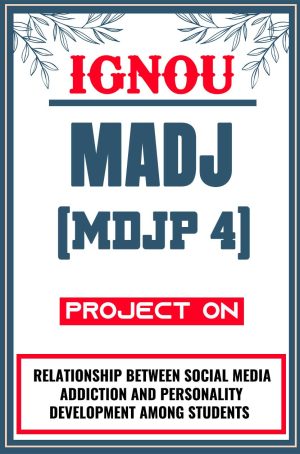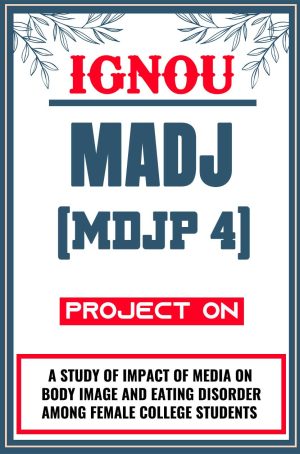Search the topic below and order the readymade IGNOU MADJ Project Report & IGNOU MADJ Project Synopsis
After successful payment, we will dispatch your MADJ Project Report & MADJ Synopsis to your postal address on the same day. In addition, if you have any queries or need any support, please WhatsApp us at 9958947060.
Note: Please keep in mind that these are ready-made sample MADJ Project Report and MADJ Synopsis for students to learn how to create a MADJ synopsis and MADJ project report. Many students may be interested in purchasing them. Because IGNOU does not accept repeated projects, there will be a chance of rejecting these projects.
IF YOU WANT AN UNIQUE IGNOU MADJ PROJECT REPORT & SYNOPSIS THAT HAS NOT BEEN SUBMITTED BY ANY OTHER STUDENT AND HAS A GUARANTEE OF ACCEPTANCE, WHATSAPP US AT 9958947060 AND YOU CAN ALSO TELL YOUR PROJECT TOPIC.
Choosing a project can be a difficult undertaking at times, especially when there are so many projects on the market. Here are some of the reasons why our students should choose us:
100% Approval Guarantee: One of the main reasons students choose our Projects is the 100% approval guarantee. If you choose our MBA Project, you will be assured of its approval. If it is rejected (which is extremely unlikely!), we will give you another project at no further cost to you.
According to the IGNOU Guidelines: Our projects absolutely follow to IGNOU rules. If you examine our projects and compare them to those of others, you will see how strictly we adhere to IGNOU criteria.
Availability of both ready-made and customized projects: We provide both project formats. You can refer to and use ready-made or customized projects based on your needs.
-
Sale!

-
Sale!

IGNOU MADJ Project (MDJP 4) Synopsis/Proposal & Project Report/Dissertation in Hard-Copy (Sample-3)
Original price was: ₹499.00.₹249.00Current price is: ₹249.00. -
Sale!

IGNOU MADJ Project (MDJP 4) Synopsis/Proposal & Project Report/Dissertation in Hard-Copy (Sample-2)
Original price was: ₹499.00.₹249.00Current price is: ₹249.00. -
Sale!

IGNOU MADJ Project (MDJP 4) Synopsis/Proposal & Project Report/Dissertation in Hard-Copy (Sample-1)
Original price was: ₹499.00.₹249.00Current price is: ₹249.00.
